May 16, 2025 | 07:44 GMT +7
May 16, 2025 | 07:44 GMT +7
Hotline: 0913.378.918
May 16, 2025 | 07:44 GMT +7
Hotline: 0913.378.918
The Vietnam Academy of Agricultural Sciences (VAAS), in partnership with the Korea Program for International Cooperation in Agricultural Technology (KOPIA) and the Korea Rural Development Administration (RDA), held an international seminar on "Sustainable sericulture development" on 19 October.
Prof. Nguyen Hong Son, the director of VAAS, stated that cultivating mulberry bushes and rearing silkworms is a roughly 4,000-year-old practice that partially satisfies humankind's clothing demands.
In recent years, Vietnam's mulberry production has resumed its upward trend. In 2021, the country had 32 provinces dedicated to mulberry farming, with a total area of 13,166 hectares (an increase of 53.99% from 2010). It exported 1,067 tons of silk, an increase of 94% compared to 2010 with a total export value of USD 72.7 million, ranking it as the fourth largest exporter of silk in the world.
However, the expansion of the silkworm business in Vietnam is not sustainable, as around 90 percent of silkworm seed eggs are imported and the mechanism for producing seed eggs is deficient. There are only a few kinds of silkworm and mulberry with high yields and superior quality. People who cultivate mulberry to breed silkworms continue to invest little and apply few technological innovations to their production. The Vietnamese mulberry silk industry market is still poor and lacks knowledge, as well as a diversity of goods, particularly those with a high added value that is produced from mulberry silk.
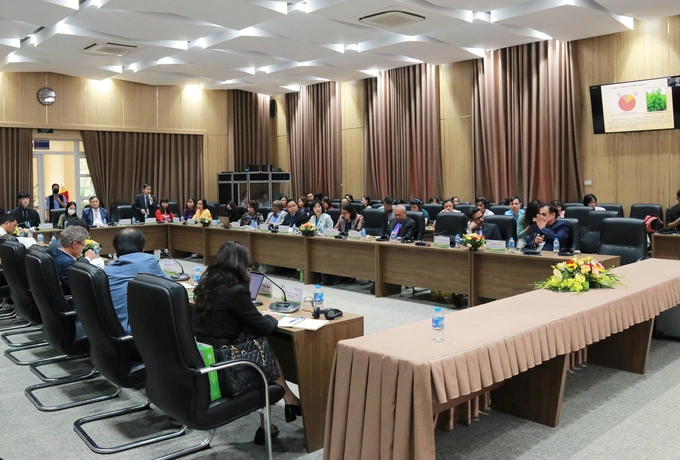
The conference is a place to connect and share the current status of mulberry production in other countries in order to improve the position of Vietnam's mulberry farming with the world. Photo: Hoang Giang.
The Director General of the Korea Rural Development Administration (RDA), Dr. Kwon Taek-Ryoun, disclosed that KOPIA is creating the "VH2020" type ideal for the agricultural environment in Vietnam and expanding the mulberry silk business. By manufacturing processed items such as silkworm soap and toothpaste, KOPIA is enhancing the silkworm farming sector.
"The mountainous and northern regions of Vietnam are favorable environments for the mulberry silk industry, creating favorable conditions for mulberry leaf production and high-quality silkworm rearing in cool weather throughout the year, along with a skilled labor force and favorable government policies. The production capacity of cocoons produced by silkworms in Vietnam is a significant advantage over other crops due to the high turnover rate of overall farm revenue. We anticipate that Vietnam's silk sector will flourish in the coming year "Dr. Kwon Taek-Ryoun stated during the conference.
This year, KOPIA has spent VND29 billion in Yen Bai province to establish 150 hectares of new mulberry fields. KOPIA has also contributed to the growth of Vietnam's mulberry industry through the pilot silk village project, which involves 500 farmers.
Dr. Le Hong Van, the director of Vietseri, stated that the nation has over 38,000 agricultural households and over 100,000 people involved in the sericulture sector in 35 provinces and cities. Mulberry cultivation and silkworm rearing account for approximately 2% of the entire export value of agricultural items.
In terms of both production and commerce, the mulberry farming business in Vietnam has met several challenges during its development. The majority of those engaged in mulberry farming and silkworm rearing are small-scale farmers without a comprehensive plan or long-term development scheme. Mechanization and investment in manufacturing are still restricted, and several phases of production are still performed manually, including mulberry planting, silkworm rearing, and leaf plucking. Climate change, pests, and illnesses of mulberry trees and silkworms significantly reduce the actual cocoon output compared to the potential yield.
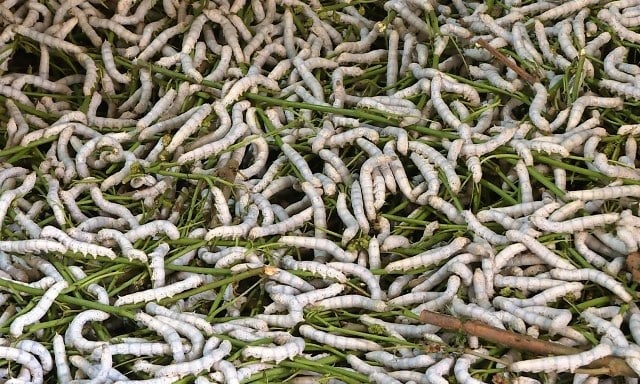
Growing mulberry and raising silkworms has become a traditional profession with profound social, historical and humanistic significance.
Vietnam produces primarily cocoons and raw silk for export, although the relationship between farmers and merchants is weak. The industries of silk weaving, dying, printing, and finishing remain poor. In its infancy, the production of new goods with high added value cannot guarantee a stable market for farmers and silk nurseries.
Dr. Le Hong Van presented several ideas for the development of sustainable silkworm farming, including the need to grow the mulberry business on a global scale in order to promote the assets of each location. The production of mulberry and silkworm rearing should be planned for development in three major regions, including the Central Highlands, the Northern Midlands and Mountains, and the North Central Coast; develop the textile and garment industry in the Red River Delta and the South Central Coast with an eye toward combining with tourism.
Relevant agencies should promote propaganda, training, and information for officials and farmers regarding new varieties; knowledge of techniques for growing mulberries, rearing silkworms, and preventing pests and diseases; benefits of late-stage silkworm rearing as well as the success of advanced models that farmers can follow; and benefits of late-stage silkworm rearing as well as the success of advanced models.
It is essential to encourage farmers to invest in professional silkworm-rearing houses, which are easy to clean and disinfect to prevent epidemics; apply new techniques in production, supporting the conversion of late-age silkworm rearing on bamboo trays to technical farming on the floor to reduce labor costs, increase silkworm rearing scale, and boost income.
Translated by Linh Linh

(VAN) Use of high-quality broodstock and biotechnology is regarded as the most effective approach to ensuring sustainable and economically viable shrimp aquaculture ahead of climate change and the emergence of increasingly intricate disease patterns.

(VAN) Carbon farming is a form of agricultural practices that helps absorb more greenhouse gases than it emits, through smart management of soil, crops, and livestock.

(VAN) This is a key content of the Memorandum of Understanding recently signed between the Vietnam Fisheries Society and Kunihiro Inc of Japan.

(VAN) To achieve the goal, local authorities and businesses in Kon Tum province have fully prepared the necessary conditions for the new Ngoc Linh ginseng planting season.
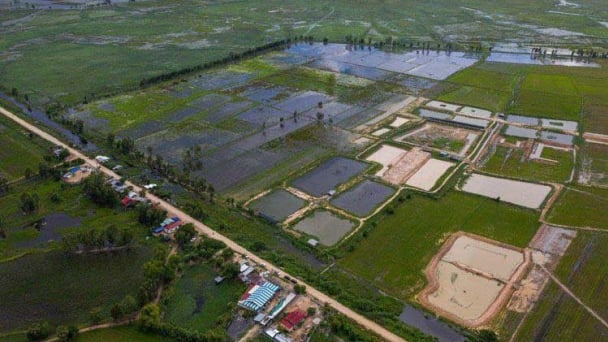
(VAN) Jiangsu province is gearing up to host training programs in Phnom Penh, the capital of Cambodia, this year to establish the Fish and Rice Corridor.
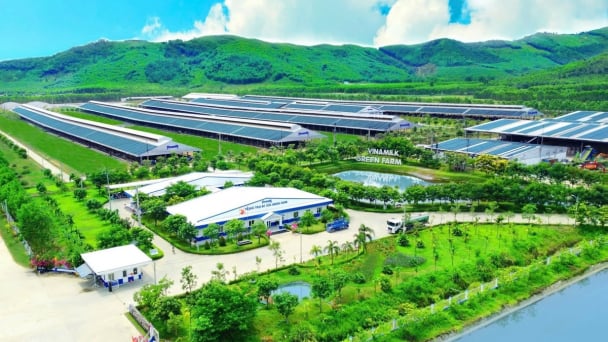
(VAN) Le Hoang Minh, representing Vinamilk, shared the company's experience in energy saving and green energy transition for production at a workshop held during the P4G Summit.
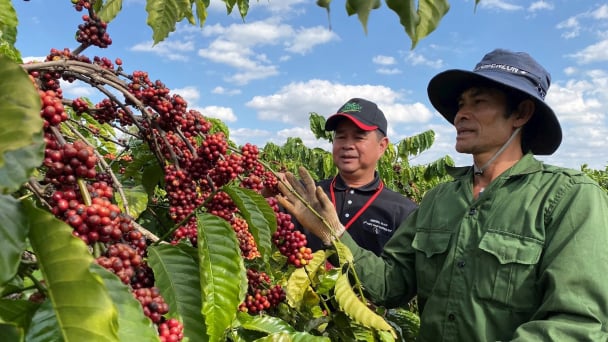
(VAN) Businesses emphasize fairness and equality when integrating social factors into their sustainable development strategies.